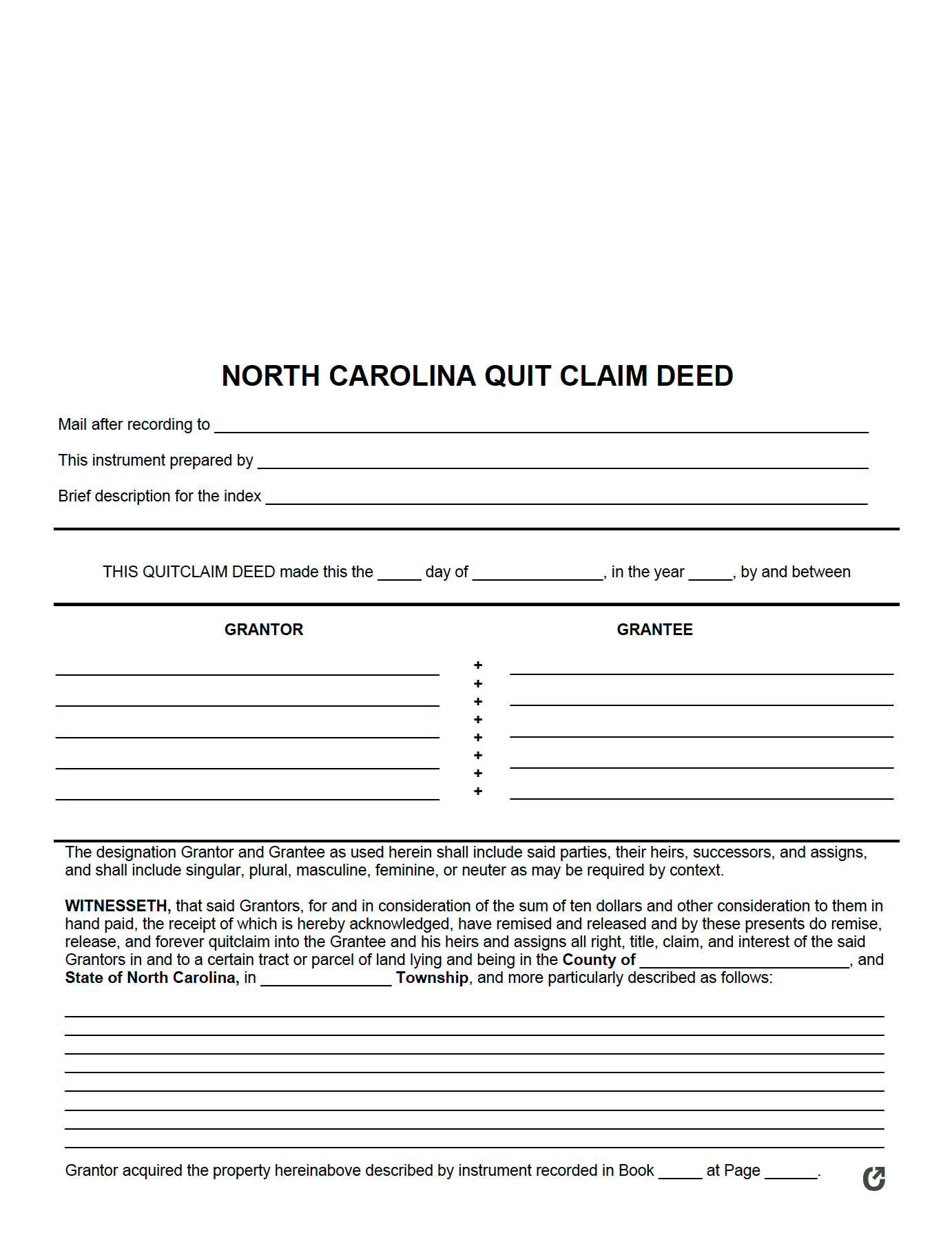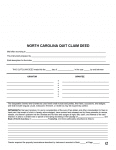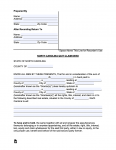North Carolina Quit Claim Deed Form
The North Carolina Quit Claim Deed is a legal form used for transferring ownership of a property from one individual to another. Unlike other deeds (such as Warranty Deeds), the contract contains no protections for the party receiving the property (known as the Grantee/s). This means that the title could potentially contain errors or outside interest in the property. To help avoid this, the Grantee(s) can conduct a title search. However, if a Grantee does not personally know and trust the Grantor (owner of the property), they should not use the form type.
There are many uses of the form, some of which include:
- Transferring ownership of a property per the terms of a divorce settlement,
- Gifting property to a child,
- Adding a spouse’s name on the property title, or
- Fixing a title defect or cloud on the title.
Download: Adobe PDF, MS Word (.docx)
Laws: Chapter 47B: “Real Property Marketable Title Act”
Versions (3)
Download: Adobe PDF, MS Word (.docx)
Download: Adobe PDF, MS Word (.docx)
Download: Adobe PDF
Requirements
Recording Standards: The state’s Associate of Registers of Deeds has published a resource called “Document Standards.pdf” that sets out minimum standards that must be upheld for real property instruments (deeds included). The following table outlines the recording standards set by the North Carolina Register of Deeds:
| Requirement | Details |
|---|---|
| Title of document: | Must state the title of the document, e.g. "Quit Claim Deed," at the top of the first page below the three inch (3") blank margin |
| Margins at the top of the first page: | A minimum of three inches (3") |
| Blank margins on the left, right, and bottom of the first page: | A minimum of half an inch (0.5") on each side |
| Blank margins on all subsequent pages: | A minimum of half an inch (0.5") on each side |
| Paper size: | Must be either eight and a half inches (8.5") by eleven inches (11"), or eight and a half inches (8.5") by fourteen inches (14") |
| Text and paper color: | Typed or printed in black ink on white paper |
| Text size: | A minimum of ten (10) points |
| Typed or printed text: | Must only appear on one side of a page |
Failure to comply with the standards will result in the deed being rejected for recording or the imposition of a twenty-five dollar ($25.00) fine.
Signing Requirements (§ 47-38): The Grantor must sign the deed and acknowledge it before a Notary Public.
How to File
All NC quit claim deeds need to be filed at the Registry of Deeds in the same county of the property. The fees for this service may differ across the one hundred (100) counties in North Carolina, so the filer should refer to the relevant county’s website to find out the fee schedule. As a general guide, the Associate of Registers of Deeds states that the recording fees are as follows:
- Sixty-four dollars ($64.00) for the first thirty-five (35) pages, and
- Four dollars ($4.00) for each additional page.
It is critical to be aware of the fact that North Carolina follows a “race recording statute” (§ 47-18). Delaware and Louisiana are the only two other states that follow this type of recording statute. It is the strictest of the three recording statutes in the country (the other two types are called a “race-notice statute” and a “notice statute”).
In a race recording statute state like North Carolina, the first party to record a conveyance wins. Winning in this context means that the party who records their deed first will become the legal owner of the property. While other recording statutes also require “notice” to be given, a race recording statute only requires the recording of a valid conveyance to establish ownership. For this reason, the process is commonly referred to as “race to the courthouse.”



